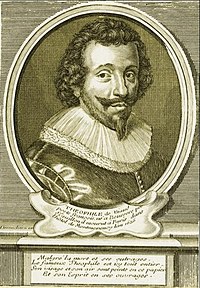Théophile de Viau

Théophile de Viau (1590 – 25 September 1626) was a French
Life
Born at
Because of his heretical views and his
While de Viau was in hiding, the sentence was carried out in effigy, but the poet was eventually caught in flight toward England and put in the
Writings
De Viau's wrote
He wrote Fragment d'une histoire comique (English: Fragment of a Comic Novel, 1623), in which he expressed his literary tastes. He was not a supporter of "the metaphoric excess and lofty erudition" of his contemporaries. But he also thought "sterile" the constraints proposed by would-be reformers such as François de Malherbe. This disregard for constraints probably added to his reputation as a non-conformist.[2]
De Viau's poetic style refused the logical and classicist constraints of François de Malherbe and remained attached to the emotional and the baroque images of the late Renaissance, such as in his ode Un corbeau devant moi croasse (A crow before me caws), which paints a fantastic scene of thunder, serpents and fire (much like a painting by Salvator Rosa). Two of his poems are melancholy pleas to the king on the subject of his incarceration or exile, and this tone of sadness is also present in his ode On Solitide which mixes classical motifs with an elegy about the poet in the midst of a forest.
Théophile de Viau was "rediscovered" by the French Romantics in the 19th century.
References
- ^ a b Chisholm 1911.
- ^ Stedman (2012), pp. 59–61.
Sources
- This article incorporates text from a publication now in the public domain: Chisholm, Hugh, ed. (1911). "Théophile". Encyclopædia Britannica. Vol. 26 (11th ed.). Cambridge University Press. p. 786.
- Stedman, Allison (2012), Rococo Fiction in France, 1600-1715: Seditious Frivolity, Rowman & Littlefield, ISBN 978-1611484366
- Dandrey, Patrick, ed. Dictionnaire des lettres françaises: Le XVIIe siècle. Collection: La Pochothèque. Paris: Fayard, 1996.
- Allem, Maurice, ed. Anthologie poétique française: XVIIe siècle. Paris: Garnier Frères, 1966.
- Oeuvre poétique complete de Théophile de Viau.
External links
- Works by or about Théophile de Viau at Internet Archive
- English translations of De Viau's poems
- Works by Théophile de Viau at LibriVox (public domain audiobooks)

